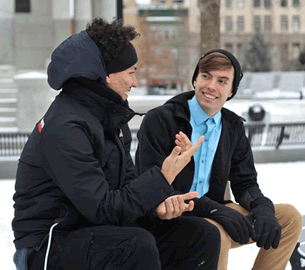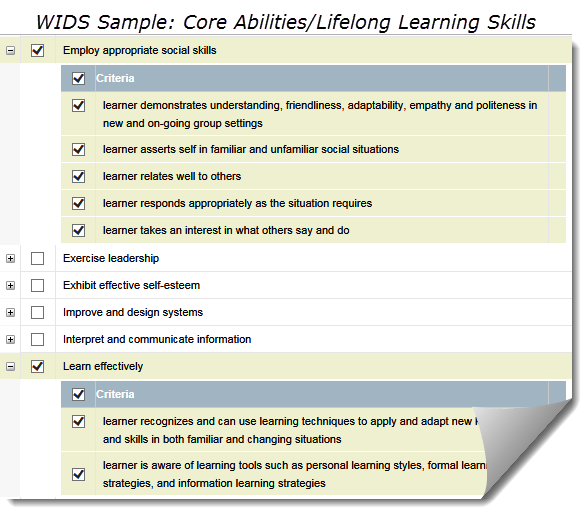Lifelong Learning Skills in Curriculum
Community and technical colleges are integrating “lifelong learning skills” that go beyond specific knowledge or occupational areas. These transferable skills are essential to an individual's intellectual, physical, and emotional success regardless of occupational or life role. In Elena Silva's "Measuring Skills for the 21st Century" report, she says "decades of research reveal that there is, in fact, no reason to separate the acquisition of learning core content and basic skills from more advanced analytical and thinking skills." In the WIDS model, these advanced skills are called “core abilities.”
The Curriculum Challenge
For many colleges, the challenge to include core abilities is that there is no exact formula for incorporating them into the curriculum. Jane Healy argues that we must banish core abilities as "invisible curriculum" and explicitly name and post them (see “Failure to Connect: How Computers Affect Our Children's Minds--For Better And Worse”). Healy describes these types of skills in broad categories:
- critical thinking

- effective communication
- collaboration
- community contribution
The fact that these skills can sometimes seem ambiguous, abstract, and even controversial adds to the challenge of getting them into the curriculum. However, few colleges consider these skills as unimportant, even in relationship to academics. And in fact, many colleges currently promote lifelong learning as a core value in their mission statements.
Colleges are fertile ground for the development of skills useable outside a discipline or classroom. Typically, however, lifelong learning skills are not stated at the course level and therefore, not planned into the curriculum. A traditional curricular format has no vehicle for explicitly stating and assessing these skills. As a result, lifelong learning skills have been over-shadowed by content-specific competencies.
WIDS: Define, Link, Assess, Integrate, Document
 WIDS software helps educators specify and integrate these skills into the curriculum in a systematic way – both in courses and in programs. Educators define organization-wide lifelong skills using WIDS Core Ability Library. Core abilities are preloaded and contain examples and indicators. Educators can also develop core abilities specific to their organization. The lifelong skills can be incorporated into performance assessment, by adding the indicators to a rubric or checklist.
WIDS software helps educators specify and integrate these skills into the curriculum in a systematic way – both in courses and in programs. Educators define organization-wide lifelong skills using WIDS Core Ability Library. Core abilities are preloaded and contain examples and indicators. Educators can also develop core abilities specific to their organization. The lifelong skills can be incorporated into performance assessment, by adding the indicators to a rubric or checklist.
By designing, linking, and assessing lifelong skills at the course level, teachers can bring broad college-wide goals to the frontlines of the classroom where learners can apply them in a variety of contexts.
For example, students involved in group work address the skill of "employ appropriate social skills.” Students practice working together to achieve a goal, and they might be evaluated on their ability to work as team members in addition to their academic or technical skill. They can "learn effectively" by seeking and interpreting information rather than relying on information the teacher provides. Students could also self-assess, using a rubric designed in WIDS, as to how well they have demonstrated these skills throughout the course. They could provide feedback about the skills to one another and reflect.
WIDS framework gives colleges a tool to integrate lifelong skills throughout the curriculum. Once that happens, students are better prepared for life -- both in and out of the classroom.
This article is an excerpt from a white paper authored by WIDS. Read more about WIDS and Performance-Based Learning.
17375